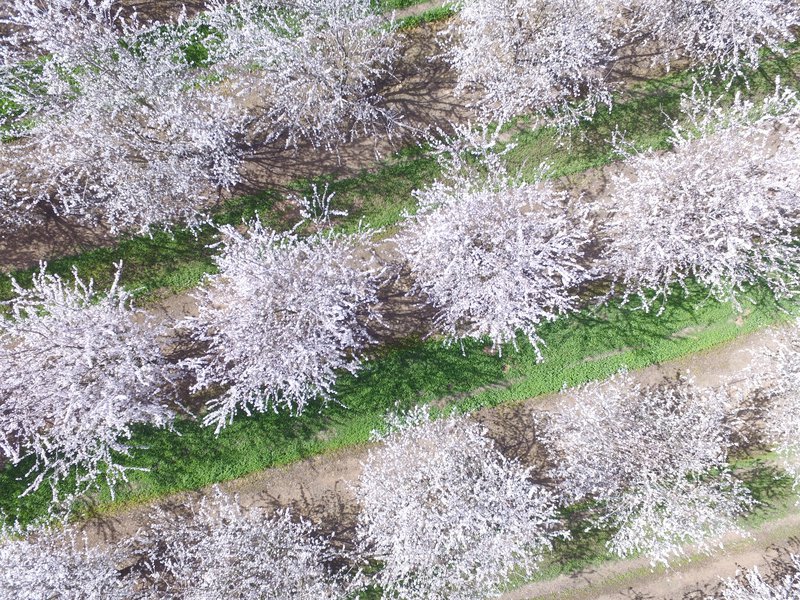A campaign to protect one local family’s ranch is asking the community for donations to ensure the treasured land remains a profitable agriculture operation — forever.
Randy Fiorini’s grandfather settled outside of Delhi on land just south of Turlock in 1909 and began a farming operation, before the Turlock Irrigation District even existed to deliver water to his crops. To this day, Fiorini continues to farm his family’s original homestead as well as the land across the street which he purchased in the 1970s.
Now, Fiorini is hoping that his 60-acre almond ranch will continue to be farmed by his children and their children well into the land’s future and continue the family’s legacy. In order to ensure this, Fiorini reached out to the California Farmland Trust to help protect the land from being subdivided and developed as the nearby town of Delhi continues to grow.
“There’s a connection to the land that I don't think too many people fully understand. It’s like a spiritual connection,” Fiorini said. “The land has value and people buy and sell property all the time, but I've got two of my children involved as partners in our farming operation and I’ve got 10 grandchildren, many of whom have expressed an interest in farming. There will be pressure in the future to convert farmland for urban development...I thought this would be the very best way, to enter into a conservation easement to make sure that this property remains an agriculture perpetuity.”
CFT has partnered with farmers for over 16 years to help protect their land, while also contributing to agriculture’s unique role in climate benefits.
The Fiorini family has adopted and embraced sustainable farming practices that reduce greenhouse gas emissions, improve the biodiversity of beneficial insects and further reduce soil erosion in recent years. In the coming months, CFT will be pursuing a grant that will provide some of the funding needed to purchase the development right for Fiorini Ranch and protect the land with an agricultural conservation easement.
CFT is required to source matching funds when pursuing grant funding, and the Henry Mayo Newhall Foundation provided CFT with nearly half of the matching funds, or $80,000, needed to meet the requirement. CFT now looks to raise the remaining $85,000.

“Working with the Fiorini family to ensure this land will provide food, open space and climate benefits is essential,” CFT Executive Director Charlotte Mitchell said. “The support from the Henry Mayo Newhall Foundation really made this project achievable. It’s difficult to obtain the match requirement needed for a grant and the Henry Mayo Newhall Foundation provided funding that will essentially double every other donation we receive for the project, helping us achieve the match requirement.”
The first step will be launching a campaign that leverages the Foundation’s $80,000 donation to raise the remaining $85,000 needed to obtain the match required. CFT will simultaneously pursue a grant for the remaining seventy-five percent needed to fund the easement.
Once secured, the easement will ensure the farmland will never be subdivided and will no longer be subject to development pressures from nearby communities for housing or commercial development.
The easement, coupled with sustainable practices enacted at the ranch, will be enough to make sure the farming operation supports Fiorini’s family for the foreseeable future, he said. Fiorini noted that offers for farmland from developers are usually double what the land is worth when being used for agricultural purposes.
“The offers that will come for urban development will be our choice to accept or reject, but I don’t want to put the family in a position where the farming enterprise is not profitable enough to pay all the bills because in that case, they’re not going to have any choice,” Fiorini said.
Fiorini grew up a Delhi resident and said maintaining an agricultural “buffer” around cities and towns in the Central Valley is vital to its continued success. The Fiorini Ranch is still six miles away from the edge of Turlock and he doesn’t anticipate the city’s limits reaching his doorstep anytime soon. He has seen Denair and Turlock grow closer together over the years to development, with construction companies purchasing land similar to his in the process.
Fiorini encouraged any community members who care about preserving ag land to contribute to the cause.
“If there's an interest from them in supporting sustainable agriculture and if there is a value that they place on the urban settings being surrounded by green space and agriculture, these farmland easements are a good way to ensure that,” he said.
To learn more or become involved in this project, visit www.cafarmtrust.org/protect-fiorini-ranch.





